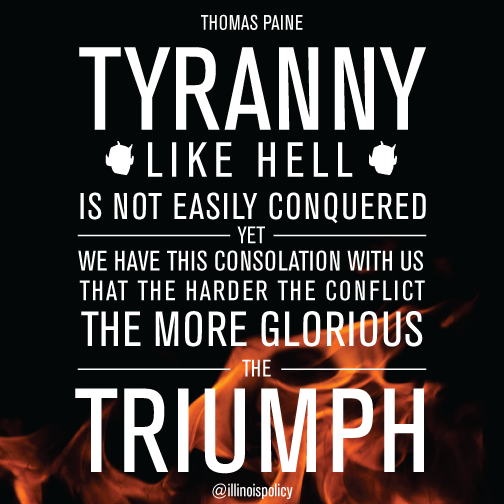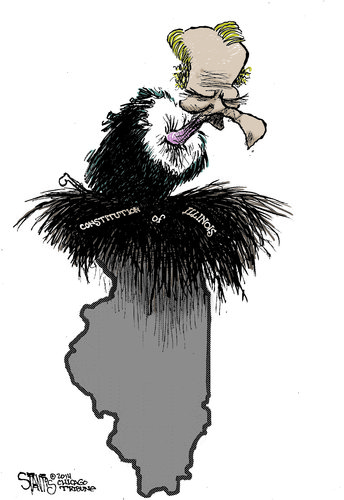QUOTE OF THE DAY
Chicago Tribune: Emanuel touts monthly phone fee hike for pensions
Mayor Rahm Emanuel found himself in the unusual position Wednesday of talking up his idea to significantly increase the monthly telephone fees paid by Chicagoans.
The mayor usually goes to great lengths to point out how he has saved residents even small amounts of money, but his promotion of the phone fee hike is a testament to how badly he and aldermen want to avoid being associated with a property tax hike as they head into re-election campaigns.
Emanuel originally wanted to use a property tax increase to come up with the tens of millions of dollars he needs this year to pay for a partial City Hall worker pension fix. On Wednesday, Emanuel formally introduced his alternative, an ordinance to raise monthly 911 charges on wireless phones and land lines by $1.40, to $3.90 for each line. In addition, the charge on prepaid phones would rise by 9 percent.
Chicago Tribune: Chicago looking at added Dumpster fee
Owners of commercial Dumpsters would face an additional city fee as part of a plan to require them to add identification tags to the receptacles that would allow workers to use electronic devices to determine whether the permit fees are up to date.
The City Council Finance Committee today advanced the proposal by Ald. Edward Burke to make Dumpster owners affix a computer-compatible identification tag, such as a bar code or a transmitter, to the containers outside restaurants, grocery stores, condominiums and other businesses.
City officials are still working on exactly what form the technology will take, according to Charles Williams, commissioner of Streets and Sanitation.
New York Times: Why Government Pension Funds Became Addicted to Risk
A public pension fund works like this: The government promises to make payments to its employees after they retire; it invests money now and uses those investments, and the returns on them, to make those promised payments later.
Back when interest rates were high, this was fairly simple to do. Pension funds could buy bonds — ideally bonds that would mature around the time they would need the money to pay pensioners — and use the interest on those bonds to fund the payouts. In 1972, more than 70 percent of pension fund investment portfolios consisted of bonds and cash, according to a new analysis from the Pew Charitable Trusts and the Laura and John Arnold Foundation.
But as interest rates began their long fall, pension funds faced a dilemma. Staying heavily invested in bonds would force governments either to set aside more cash upfront or to cut pension promises. So instead, pension funds radically changed their investment strategies, embracing investments that produce higher returns but also involve more risk. This shift has replaced an explicit cost with a hidden one: that lawmakers will have to divert more tax dollars into pension funds, cut back on benefits or both when stock market crashes cause pension fund asset values to decline.
Washington Post: Downtown D.C. traffic gridlocked as taxi drivers protest Uber, Lyft, Sidecar
Drivers in and around downtown D.C. were gridlocked in traffic Wednesday as a caravan of angry taxi drivers made its way from East Potomac Park to Freedom Plaza — in a protest against app-based ride sharing services such as UberX.
Authorities said Pennsylvania Avenue Northwest opened in both directions around 1 p.m. The roadway had been closed from 15th to 9th streets Northwest because of the protest. The street closure caused other delays in the downtown area. Ironically, because of the protest, some people reported difficulty hailing cabs.
The drivers are members of the Teamster-affiliated D.C. Taxi Operators Association and the target of their protest is digital dispatched ride-sharing services such as Lyft, UberX and Sidecar, where regular people give rides to others using their private vehicles. The cab drivers have been at odds with the new services saying they have an unfair advantage over regular cabs since they don’t have to follow the same rules and pay the same fees.
Tax Foundation: Combined Effective Commercial Jet Fuel Tax Rates and Fees by State
For this week’s tax map, we take a look at combined tax rates on commercial jet fuel in each state. When fuel for airplanes is bought at airports, much as when fuel for cars is bought at gas stations, there are taxes owed on that fuel. The airline industry estimates that, for every penny increase per gallon in fuel costs, industry-wide fuel expenses rise $180 million, which means $180 million in extra costs for passengers because airlines do not presently have wide profit margins. Fuel expenses range from 20 to 40 percent of airlines’ operating costs, so these costs are a significant component driving ticket prices for consumers.
Several types of taxes apply to jet fuel. First, there’s a federal jet fuel excise tax applied nationwide. This tax ranges from $0.219 for general aviation such as private jets to $0.044, for commercial aviation. Then there are state or local jet fuel taxes, which range widely as well, and which sometimes vary for private versus commercial aviation. Beyond that, some states include jet fuel in their sales tax base, and some states apply additional taxes (such as environmentally-related taxes) to fuel.
As with gas taxes, there is a legitimate argument to be made for some of these taxes. If they are to be levied, using fuel excise taxes to pay for airports makes sense, much as using gas taxes topay for roads makes sense. Federal rules, in fact, require that jet fuel taxes finance airports, though some states and localities have attempted to divert fuel tax collections.
Reuters: SEC seeks restraining order against Illinois city’s bond sale
(Reuters) – The Securities and Exchange Commission is seeking an emergency restraining order to prevent a Chicago suburb from selling bonds this month, alleging in court documents filed on Tuesday that the city and its comptroller misused bond proceeds and schemed to defraud investors.
In a complaint filed against the town of Harvey, Illinois, and the comptroller, Joseph Letke, in the U.S. District Court for the Northern District of Illinois, the SEC also demanded a jury trial – an unusual request in the SEC’s current crackdown on the $3.7 trillion municipal bond market.
Harvey is “exploring a new issuance of bonds as soon as late June 2014,” the SEC said.
Alton Daily News: Growth for Illinois Cities
What are Illinois’ fastest-growing cities?
According to a ranking by Nerd Wallet Finance, Chicago Heights is No. 1, followed by Melrose Park, Champaign, Woodstock, Rolling Meadows, Berwyn, South Holland, Normal, Glen Ellyn and Des Plaines. (The top southwestern Illinois city was Belleville at #22. Alton was #101.)
Many of these are blue-collar towns that don’t often get on a list like this, says Maggie Clark, the author of the study. “We do get some surprising results, and I think people are really interested in that. When you strip away assumptions that people make about places, you get a lot of interesting results, and we’ve seen that across states. We’ve done this study now in four states and it’s been real interesting to see some of the results,” she said.
Washington Post: The economy shrank almost 3 percent in Q1. Holy guacamole.
It just keeps getting worse.
The government released its third estimate of economic activity during the first quarter, and it surpassed our wildest expectations — in all the wrong ways. The Bureau of Economic Analysis said Wednesday morning that the economy actually shrank at an annualized rate of 2.9 percent over the winter, the worst reading since the recession. Driving the decline was weak consumer spending, which the government now says grew by a meager 1 percent during the first quarter.
Let’s get all of the caveats out of the way first: It was really cold during the winter. Hiring picked up dramatically as spring grew closer. Most economists say the rebound has already begun, and the big drop in the first quarter may just have fueled pent-up demand that is fueling the pickup this quarter.
CARTOON OF THE DAY

